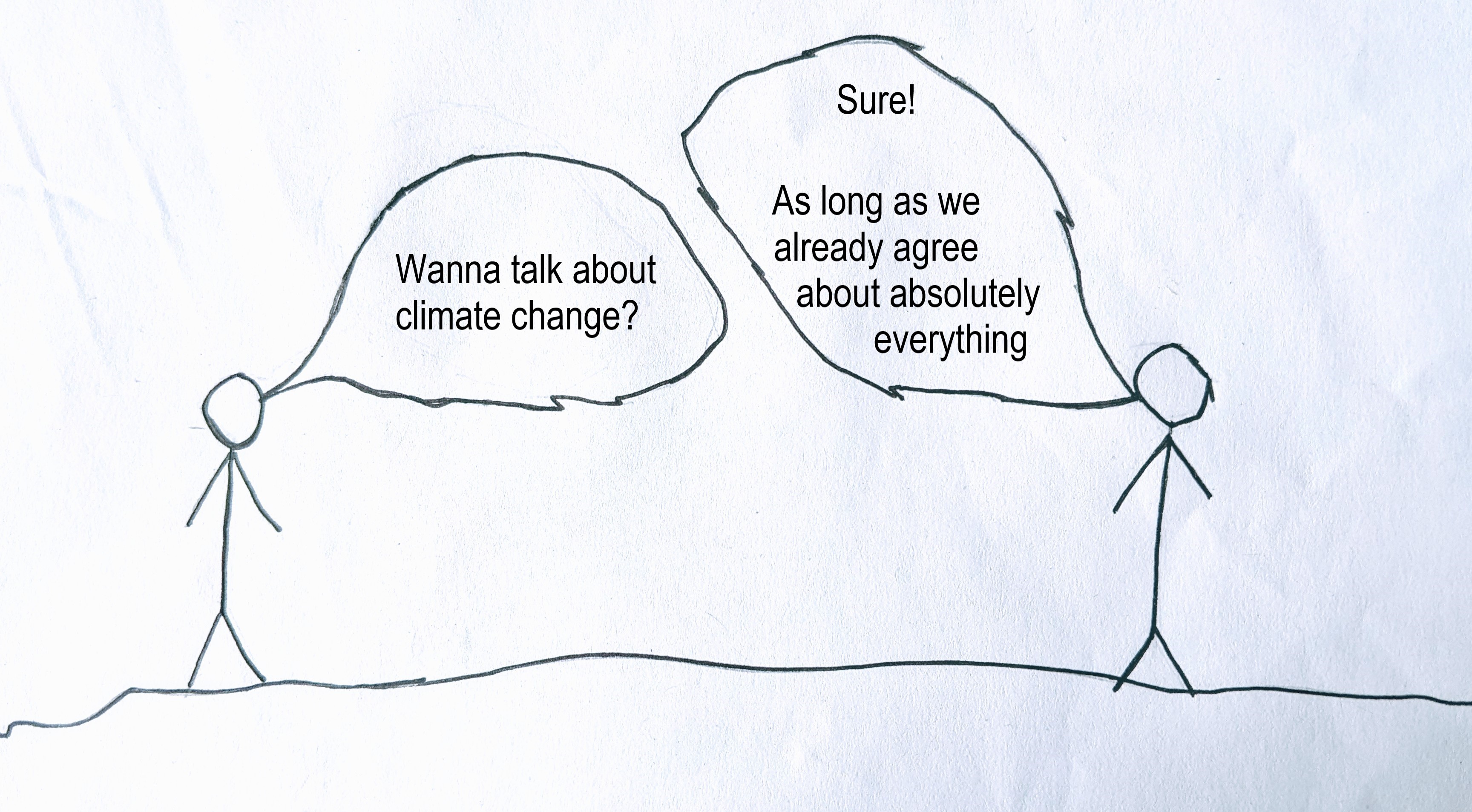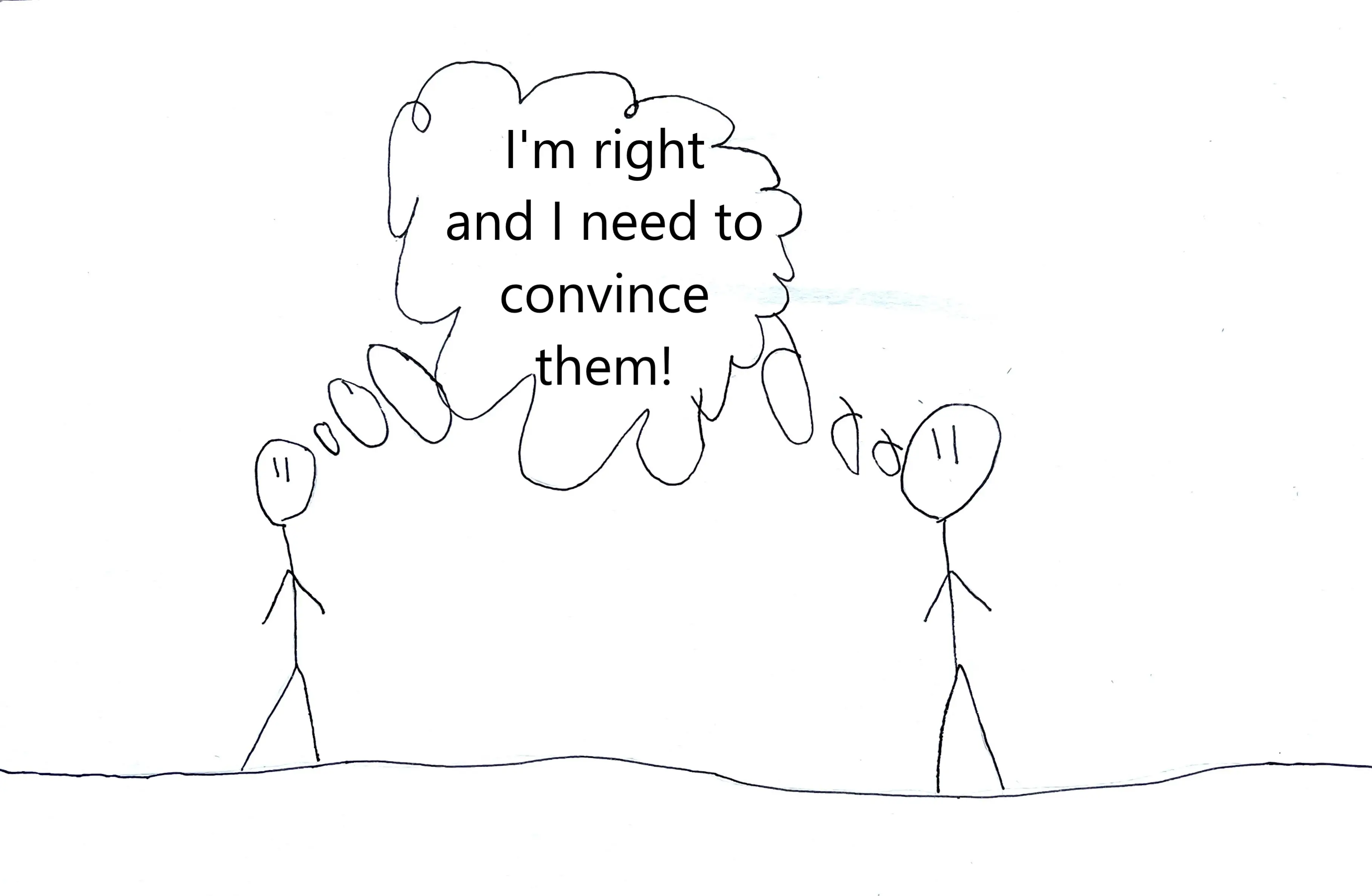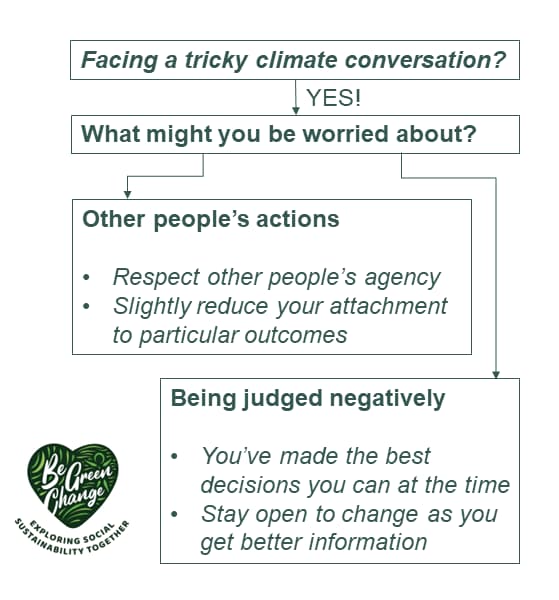New here? Sign up to my newsletter and receive a FREE SET OF POSITIVE TIPS!
The psychology of climate change communication
How can we have better conversations about climate? As a sustainability professional, this is something I am always working on!
But how do you show green issues matter to you, without being patronising?
How can you react calmly when people seem to want to argue?
What can you do to maximise the chances a conversation moves us towards positive action?
In this article I’ll be sharing two simple questions to help you feel more positive about your green conversations.
I’ll also cover some psychology of climate change communication to explain how conversations can go wrong.

Two questions for success
When facing a tricky climate conversation I suggest you ask yourself two questions:
- What might you be worried about? Understand how normal anxiety leads to communication barriers (jump to this here)
- Who are you talking to? How well you know them affects the goals to aim for (jump to this here)
Let’s break them down.
Question 1: What are you worried about?
What’s really happening when we get frustrated
during a sustainability conversation?
I need to convince them
Often, we believe the person we are talking to is WRONG about something. Perhaps it’s to do with the causes of climate change, or the solutions, or what they perceive to be their responsibility (or not).
Because we think that the other person’s wrong-ness will lead to a bad outcome (faster or worse climate change), we try to work out how to convince them to change their mind. We might wish we were better at persuasion, or remembering facts, so we could ‘win’ in these situations.

However, I’m not going to talk about how you can win an argument.
In fact, when we try to win we often push people to justify themselves more, and in the process they actually double down on their opinion.
So, how can we sidestep this communication blocker?
Actively respect other people’s agency
In other words, take a deep breath, and recognise that adults are free to make decisions, even if you think they are bad ones, and you are not responsible for preventing them from making those decisions.
“Hang on a minute!” You say. “You said you would tell me how to feel more positive about conversations about climate change, but now you are telling me I have to accept people making stupid decisions which are going to have massive environmental and social impact? This doesn’t sound very positive to me!”
Well, yes, I know where you are coming from.
This can feel difficult because it means reducing our attachment to the outcomes of decisions being made by other people. Even though many of these decisions will have impacts on the planet and us.
But realising we are not responsible also relieves a huge pressure.
It is not your responsibility to fix all of this. And no one person could ever fix all of this anyway.
Instead, a group effort is needed, and to achieve that, people with different opinions need to be able to work together, which means looking beyond point scoring.
And by the way, you can still have influence (arguably more!) whilst lessening your desire for other people to agree with you.
The psychology of climate change communication
How pressure keeps us stuck
Indeed, there’s a very positive, and rather
surprising, consequence of lessening our attachment to what other people think
or do.
You actually make it more likely they will act in the way you want.
Huh?
This is because people are incredibly good at picking up on other people’s agendas. We can feel when someone wants us to do something, even if they don’t say it.
And when we feel that pressure from others it can make us dig in our heels and say “don’t tell me what I can or can’t do!” because expressing our free choice is very important to humans.
When you remove this type of pressure, people get more creative and actually more open to change.
Feeling judged
One last point.
Sometimes in a tricky conversation we are not only judging other people’s actions, but also worried about their judgement of us.
You may have to dig a bit deeper to recognise this emotion, but if you ask yourself why an interaction is bothering you, you might realise that part of you is feeling negatively judged.
We tend to react the worst to this if deep down we are a bit worried that maybe we aren’t doing things perfectly right.
(Interestingly when we feel confident in our decisions we don’t tend to feel the need to justify them so much. So if someone is really going over the top in their arguments then they might feel less certain than they seem!)
If we are feeling defensive in this way, it's important to remember we always make the best decisions we can, with the information and skills we have at the time. By staying open to changing our decisions when we receive better information, we can continue to grow and learn.
Let’s summarise all of this:

So, we've learnt that when we talk about climate change, we don't have to aim for total control over outcomes. But this doesn't mean giving up on our goals or not influencing others.
The next question will help you formulate helpful goals. Find out how by reading page 2 of this article.

I'm Rosie and you can read more about me here.